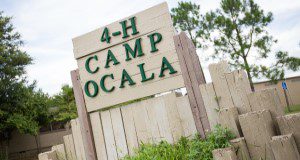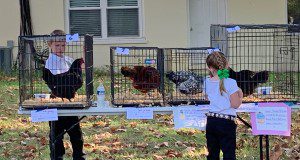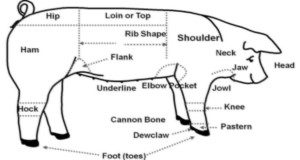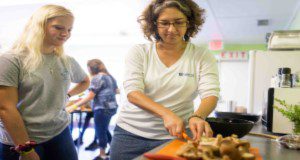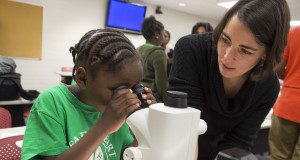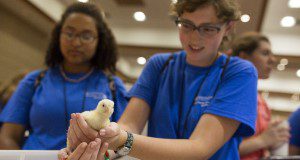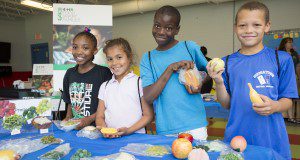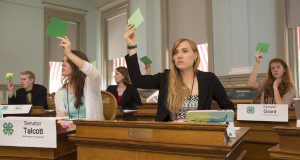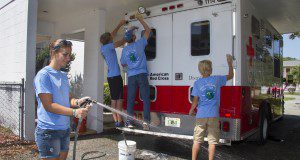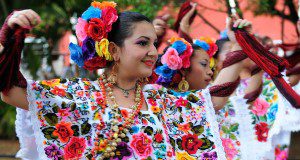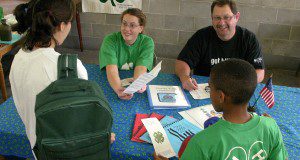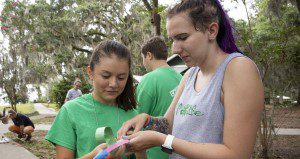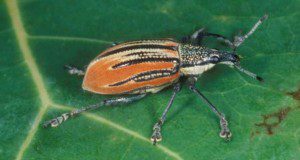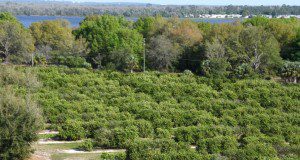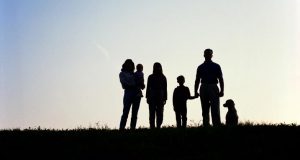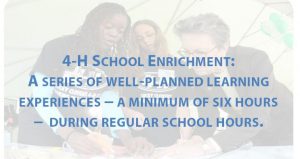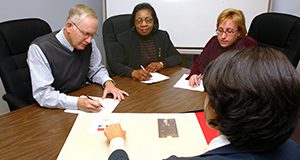Utilizing mindfulness as an evening reflection at residential camps has been developed as a tool for use at the end of the day during residential camps, though language may be modified for use at the end of classes or day camps. The four lessons in this new 7-page publication of the UF/IFAS Florida 4-H Youth Development Program, written by Heather Janney, were developed as a way for youth to reflect on their activities throughout the day. It is recommended to do only one lesson 15-20 minutes per day.
https://edis.ifas.ufl.edu/4h412
Tag: Florida 4-H Youth Development Program
Florida 4-H Poultry Project Record Book
The Florida 4-H Poultry Project Record Book is designed as a tool for Florida 4-H members to keep records for their dual-purpose or show flocks. The Florida 4-H Poultry project’s purpose is to acquire an understanding of poultry production by preparing for, purchasing, breeding, caring for, and keeping records on one or more chickens or other poultry species. This 18-page major revision by Chris Decubellis is based on the original edition by L. W. Kalch and is a publication of the UF/IFAS Extension 4-H Youth Development Program.
https://edis.ifas.ufl.edu/4h038
Raising a Market Show Hog
One of the most rewarding and educational 4-H projects is raising, finishing, and showing a market hog. Many younger 4-H’ers excitedly wait until the day when they can choose their first show pig. Parents and youth need to understand that while the hog project is an excellent opportunity, it requires a great deal of thought, preparation, time, and resources. The purpose of this new 7-page publication is to help parents and youth understand some of the commitments and preparations involved in raising a hog, as well as what to expect and what to do in order to successfully complete the project. Written by Chris DeCubellis and published by the UF/IFAS 4-H Youth Development Program.
https://edis.ifas.ufl.edu/4h407
School-Based 4-H Programming Series: Positive Youth Development (PYD) and Social Emotional Learning (SEL): How They Complement Each Other
Positive Youth Development (PYD) promotes building life skills, leadership, and relationships, and Social Emotional Learning (SEL) promotes knowledge, responsibility, and caring. Just as 4-H uses PYD as a framework, so schools use SEL. A whole program approach with appropriate curriculum provide the skills necessary for youth to succeed. This new 5-page publication of the UF/IFAS 4-H Youth Development Program explores the complementary relationship between PYD and SEL in a school-based program setting. Written by Vanessa Spero-Swingle.
https://edis.ifas.ufl.edu/4h404
School-Based 4-H Programming Series: Setting Schools Up for Success
Success at school-based sites to form 4-H clubs and programs will depend on utilizing the developmental practices of positive youth development and incorporating a set of principles known as the Essential Elements. Youth benefit from feeling like they belong, mastering a skill, gaining independence, and exhibiting generosity. The 4-H club atmosphere provides a setting for youth to achieve lifelong skills as long as they are given the opportunity to learn them. This new 4-page publication of the UF/IFAS 4-H Youth and Development Program was written by Vanessa Spero-Swingle.
https://edis.ifas.ufl.edu/4h405
School-Based 4-H Programming Series: Designing Programs Based on Time Involvement
One of the biggest factors to consider when starting a school-based program is the amount of time and level of commitment that can be provided for the 4-H program at that site. This new 5-page document discusses the degree of commitment, intensity, and Positive Youth Development (PYD) impact of the program. The most PYD-intensive program will include a model for sustainability. Sustainable programs will ultimately survive and thrive without continual supervision and daily maintenance. Written by Vanessa Spero-Swingle and published by the UF/IFAS 4-H Youth Development Program.
https://edis.ifas.ufl.edu/4h406
Exploring Citizenship, Unit VII: My World
The 4-H Citizenship Project offers the opportunity to help 4-H members relate all of their 4-H projects and experiences to the world around them. The 4-H Citizenship manuals will serve as a guide for 4-H Citizenship experiences. To be truly meaningful to the real-life needs and interests of your group, the contribution of volunteer leaders is essential. Each person, neighborhood, and community has individual needs that you can help your group identify. This 14-page major revision of Unit VII covers the “My World” project. Written by John Rutledge, Joy C. Jordan, and Dale Pracht and published by the UF/IFAS Extension 4-H Youth Development program.
https://edis.ifas.ufl.edu/4h021
Exploring Citizenship, Unit VI: My Government
The 4-H Citizenship Project offers the opportunity to help 4-H members relate all of their 4-H projects and experiences to the world around them. The 4-H Citizenship manuals will serve as a guide for 4-H Citizenship experiences. To be truly meaningful to the real-life needs and interests of your group, the contribution of volunteer leaders is essential. Each person, neighborhood, and community has individual needs that you can help your group identify. This 23-page major revision of Unit VI covers the “My Government” project. Written by John Rutledge, Joy C. Jordan, and Dale Pracht and published by the UF/IFAS Extension 4-H Youth Development program.
https://edis.ifas.ufl.edu/4h020
Exploring Citizenship, Unit V: My Community
The 4-H Citizenship Project offers the opportunity to help 4-H members relate all of their 4-H projects and experiences to the world around them. The 4-H Citizenship manuals will serve as a guide for 4-H Citizenship experiences. To be truly meaningful to the real-life needs and interests of your group, the contribution of volunteer leaders is essential. Each person, neighborhood, and community has individual needs that you can help your group identify. This 22-page major revision of Unit V covers the “My Community” project. Written by John Rutledge, Joy C. Jordan, and Dale Pracht and published by the UF/IFAS Extension 4-H Youth Development program.
https://edis.ifas.ufl.edu/4h018
Exploring Citizenship, Unit IV: My Heritage
The 4-H Citizenship Project offers the opportunity to help 4-H members relate all of their 4-H projects and experiences to the world around them. The 4-H Citizenship manuals will serve as a guide for 4-H Citizenship experiences. To be truly meaningful to the real-life needs and interests of your group, the contribution of volunteer leaders is essential. Each person, neighborhood, and community has individual needs that you can help your group identify. This 14-page major revision of Unit IV covers the heritage project. Written by John Rutledge, Joy C. Jordan, and Dale Pracht and published by the UF/IFAS Extension 4-H Youth Development program.
https://edis.ifas.ufl.edu/4h019
Exploring Citizenship: Volunteer Guide
The 4-H Citizenship Project offers the opportunity to help 4-H members relate all of their 4-H projects and experiences to the world around them. The 4-H Citizenship manuals will serve as a guide for 4-H Citizenship experiences. To be truly meaningful to the real-life needs and interests of your group, the contribution of volunteer leaders is essential. Each person, neighborhood, and community has individual needs that you can help your group identify. This 6-page Volunteer Guide is a major revision written by John Rutledge, Joy C. Jordan, and Dale Pracht and published by the UF/IFAS Extension 4-H Youth Development program.
https://edis.ifas.ufl.edu/4h014
Florida 4-H Camp Counselor Training Guide
4-H Residential Camp Counselor Training empowers youth ages 14-18 to be positive role models, leaders, and mentors to their campers. This new 38-page guide, written by Jessica Altum Cooper and published by the UF/IFAS Florida 4-H Youth Development program, provides preparation and training modules to help youth reach their full potential as the next generation of community leaders.
http://edis.ifas.ufl.edu/4h398
Children’s Citrus Activity: Diaprepes Root Weevil
This new two-page children’s activity sheet features pictures of Diaprepes root weevil larva and adults as well as feeding damage. Page two includes a maze. Written by Lauren M. Diepenbrock and Jamie D. Burrow and published by the UF/IFAS Extension 4-H Youth Development program.
http://edis.ifas.ufl.edu/4h403
Children’s Citrus Activity: Citrus Counting
Florida is well known for its citrus industry, valued at over eight billion dollars, and is one of the top citrus-producing states in the United States. This new one-page children’s activity sheet about Florida citrus includes an activity for students learning to count and match. Written by Jamie D. Burrow and Ariel Singerman and published by the UF/IFAS Extension 4-H Youth Development Program.
http://edis.ifas.ufl.edu/4h402
School-Based 4-H Programming: Incorporating Family Engagement into Your Program
Family engagement in 4-H programs allows family members, youth, and the community to become more aware, cohesive, and invested in youth development. This 4-page fact sheet, written by Vanessa Spero-Swingle and published by the UF/IFAS Florida 4-H Youth Development Program, discusses how to incorporate family engagement into your 4-H school programming. For the purposes of Florida 4-H, a school-based program can be defined as school enrichment (offered to groups of youth, taught by Extension staff or trained volunteers, and designed to support the school curriculum), an in-school club following a more traditional club approach during school hours, or an after-school club operating directly after school hours.
https://edis.ifas.ufl.edu/4h401
School-Based 4-H Programming: Middle and High School-Age Youth Programs
All youth, regardless of age, are at risk for engaging in negative behaviors that can get them into trouble during the afterschool hours when parents and other family members are at work. Middle and high school-age youth are at an age where they can most benefit from increasing opportunities to participate in programs with a positive adult role model, gain necessary life skills, and increase their knowledge of accessible opportunities. Middle and high school programs have the potential to support graduation rates and increase post-secondary school success. This 4-page publication of the UF/IFAS Florida 4-H Youth Development Program provides strategies for success in developing these programs in your community. Written by Vanessa Spero-Swingle.
https://edis.ifas.ufl.edu/4h400
School-Based 4-H Programming: Working with Partners Effectively
Partnerships open a world of possibilities. Partnerships provide an opportunity for multiple organizations to address community challenges while benefiting at the same time through shared resources, funding, personnel, and expertise. Desiring to partner with a school-based site is beneficial, but not always easy to implement. Being professional in your collaboration, prepared in your assessment, and intentional about your needs are ways to increase the likelihood of a successful partnership. This 4-page publication of the UF/IFAS Florida 4-H Youth Development program offers tips and strategies to build healthy, mutually beneficial partnerships in your program. Written by Vanessa Spero-Swingle.
https://edis.ifas.ufl.edu/4h399
